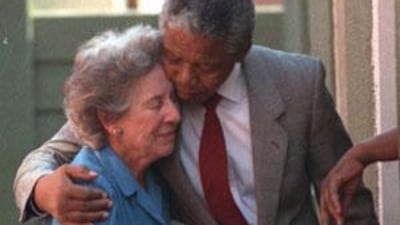JOHANNESBURG // For 13 years Helen Suzman was a lonely voice in the all-white South African parliament, the only MP opposed to apartheid, and the sole representative of her Progressive Party. She dined alone every night in the legislature, ostracised not only for her beliefs but also her gender and her Jewish religion. But with her probing questions - she put down thousands over her 36-year career as the MP for the Johannesburg suburb of Houghton - principled opposition and quick wit she took a stand for those South Africans who fundamentally disagreed with their government and, as she put it, was a representative for the millions who did not have a voice.
"It is not my questions that embarrass South Africa, but your answers," she once told a Nationalist minister infuriated by her defiance, which saw other PP MPs joining her in the legislature over the years. Hendrik Verwoerd, the architect of apartheid, once told her: "I have written you off," to which she replied: "The whole world has written you off." And she once decried the acquiescence of the then United Party opposition in the system, saying: "How often have I sat in parliament and watched a shiver go up and down these green benches looking for a spine to crawl up."
She died on New Year's Day this year at the age of 91, having lived long enough to see South Africa transform itself into a multiracial democracy and Nelson Mandela, whom she frequently visited in prison, become president. Despite some criticisms that by participating in the mechanisms of the regime she in some way legitimised it, her place in the pantheon of anti-apartheid actors is assured and was demonstrated by the line-up of speakers at a commemoration of her life in Johannesburg last weekend, among them some of the most prominent of South Africa's liberals.
But the loudest cheers were reserved for those who lamented the contrast between her own courage and willingness to defy the status quo, and the decline of parliamentary opposition under the ANC government. Dikgang Moseneke, once a political prisoner on Robben Island and now a Constitutional Court judge, said she had served as an example to black South Africans, that defiance was possible. "She was the only one who dared to demur publicly," he said.
"Once she decided apartheid was wrong it had to be opposed by every fibre of her tiny frame," said Archbishop Desmond Tutu, the Nobel laureate. That battle was eventually won, but in its 15 years in government the ruling African National Congress has become tarnished, seemingly corrupted by its own power, with constant allegations of wrongdoing at all levels. Archbishop Tutu, who represents the country's moral conscience, said last year he would not be voting for the ANC.
The general election is being held next month with Jacob Zuma, the ANC's populist presidential candidate, facing multiple charges of fraud and corruption, and without naming the organisation, Archbishop Tutu made clear his disapproval. "Our freedom has been won through the endeavours of all races," he said. "If we are the so-called rainbow nation with diverse elements, that nation owes its existence to the efforts of a remarkably diverse group of human beings of all sizes, shapes and races. No one group can lay claim to hegemony merely by virtue of its ethnicity.
"We must have zero tolerance for corruption, for those who have a proclivity to put their hands in the till. We want those holding public office, our representatives, to be principled persons who we can be proud to look up to, not embarrassments that need to be defended." Dissent is barely tolerated within the ANC, partly because of its past as a revolutionary movement, and doubly so in parliament, where South Africa's proportional representation system means that MPs' futures are dependent on their position on the party list, which is controlled by the hierarchy.
Nicky Oppenheimer, the chairman of the De Beers diamond mining group, told the audience at the University of the Witwatersrand, where Suzman was a student herself: "We needed that voice then, the voice that is unafraid to speak to power, and we need it even today." Recalling an occasion when an army officer told Suzman's nephew, then doing military service, not to tell her anything, Ann Bernstein, of the Centre for Development and Enterprise, said: "If only our present current MPs engendered such fear of exposure in today's officials."
And Mamphela Ramphele, a former anti-apartheid activist who went on to be vice chancellor of the University of Cape Town, asked why South Africans were so tolerant of abuses "for the benefit of party political interests". "Why are we silent in the face of a culture of impunity in our public service? Why are the majority of our MPs unwilling to think independently for themselves when all they stand to lose are their privileges?" she asked.
"Our freedom as a democracy is at great risk for the first time in our 15 years as a democracy. The best memorial we can build for Helen Suzman is to follow her example and strive to protect, defend and promote the foundations of our democracy." sberger@thenational.ae

